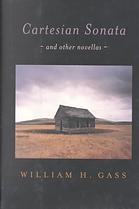
Cartesian Sonata
And Other Novellas
- اطلاعات
- نقد و بررسی
- دیدگاه کاربران
نقد و بررسی

August 3, 1998
Revered two-time winner of the National Book Critics Circle award, Gass serves up an enticing mix of high-flown lyricism, sketchy narrative and momentary brilliance in his playful latest fiction (after the celebrated The Tunnel). The title novella is really an amalgamation of three short stories written during the 1960s and '70s, before and after the great stories included in In the Heart of the Heart of the Country. Ostensibly the story of a clairvoyant named Ella Bend, her Cassandra-like curse of psychic vision and her brutal husband, this bleak interior monologue charts the narrator's descent into near madness as she escapes into an imaginary intrigue between Marianne Moore and Elizabeth Bishop. Here, as in the other novellas, Gass's love of verbal wordplay almost eliminates narrative coherency. "Bed and Breakfast" is a variation on a Rod Serling plot: a traveling accountant takes a room at a rather sinister old-fashioned bed and breakfast and feels compelled to settle down there. You'd think Walter Riffaterre, the accountant, would look for a Howard Johnson's or even a Motel 6 when the landlady starts conversing in Emily Dickinson outtakes ("what would we do if we had no burden, no weight upon our chests, we'd fly, wouldn't we? Fly like fluff, up and away to nowhere, for we're nothing but our burdens..."). While this work may puzzle or even bore some readers, Gass is an engrossing character-portraitist, whose plots depend on psychic and spiritual motions rather than linked events and whose humor, inventiveness and erudition keep the ride inviting, wherever it goes. Agent, Janklow and Nesbit.

August 1, 1998
Gass's latest work is stylistically and thematically quite similar to his first collection of stories, In the Heart of the Country (1968). Character and plot are irrelevant; words and objects are the real protagonists. In the title story, a clairvoyant housewife "sees" noises and hears voices. She could shut them out if she tried, but then she would be alone. In "Emma Enters a Sentence of Elizabeth Bishop's," a daughter stays on in her parents' house after their death, severing ties to the outside world to concentrate her full attention on favorite poems. In "Bed and Breakfast," a businessman's personality unravels as he inventories the bric-a-brac in his hotel room. All three tales are variations on the "haunted house" scenario first introduced in the famous story "Order of Insects" from the earlier collection. Despite the philosophical tone, Gass's prose is vivid and poetic: "Her eyes [were] like the holes of pebbles in the moment after striking water." Coming on the heels of his unwieldy novel The Tunnel (LJ 1/95), Cartesian Sonata supports the notion that Gass works best in shorter fictional formats. Recommended for collections of literary fiction.--Edward B. St. John, Loyola Law Sch., Los Angeles

July 1, 1998
In "Bed and Breakfast," the second novella in this wily, erudite, and haunting quartet, Gass has Riff, an itinerant accountant who cooks the books for failing small-town concerns, muse on the sorry excuses for art found in cut-rate Midwest motel rooms, including an occasionally seen portrait titled "The Laughing Philosopher." This icon hovers in the mind, an alter ego, it seems, for Gass himself, who certainly is laughing throughout much of this devilishly clever book, and he is without question philosophical, always preoccupied with the processes of thinking and writing. In the title novella, he feverishly dismantles Descartes' tidy distinction between mind and matter. The most dramatic of this complex tale's passages revolves around Ella Bend, an excruciatingly sensitive clairvoyant. Ella is just one of a series of down-home, vaguely disreputable loners and eccentrics Gass conjures in order to conduct esoteric yet deeply affecting inquiries into the nature of being and our persistent quest for meaning. Such heavy concerns notwithstanding, Gass frolics in the sea of language, reveling in long, playful lists of objects, plants, and bodily peculiarities. He comes as close to poetry as he can get, basing one astonishing and unsettling novella, "Emma Enters a Sentence of Elizabeth Bishop's," on an actual line of the poet's, an arresting performance. All in all, Gass is in peak form in this heady and provocative volume, his most welcoming work of fiction since "In the Heart of the Heart of the Country" (1968). ((Reviewed July 1998))(Reprinted with permission of Booklist, copyright 1998, American Library Association.)




دیدگاه کاربران